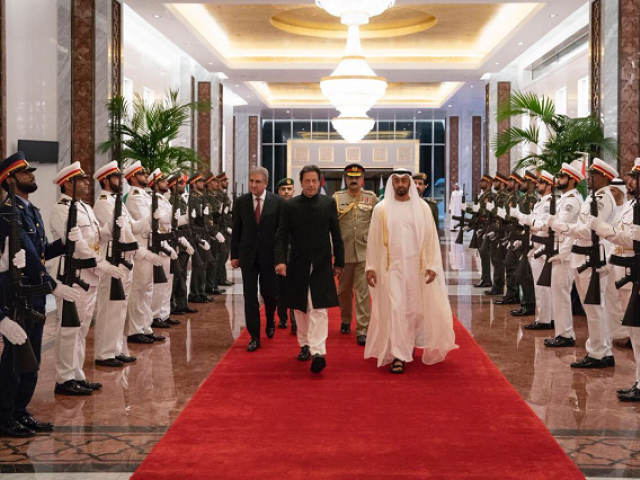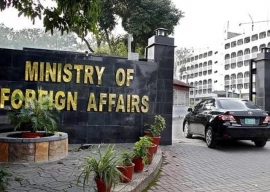
"The UAE has announced its intention to deposit US$3 billion (equivalent to AED11 billion) in the State Bank of Pakistan (SBP) to support the financial and monetary policy of the Islamic Republic of Pakistan," the Abu Dhabi Fund for Development (ADFD) said in a statement published by WAM news agency.
"It (UAE) will deposit the said amount in the coming days," the statement said.
The SBP spokesman Abid Qamar said they would soon share details whether the announced funds will be deposited in one-go or in tranches like Saudi Arabia has been doing and that when the deposits would be transferred to Pakistan.
I want to thank the UAE govt for supporting Pakistan so generously in our testing times. This reflects our commitment and friendship that has remained steadfast over the years.
— Imran Khan (@ImranKhanPTI) December 21, 2018
Earlier, Riyadh deposited two tranches of $1 billion each in Pakistan's foreign currency reserves in two months (November and December). The third and the last tranche of the total announced $3 billion in cash is expected to be deposited in January 2019.
We thank Crown Prince H.H @MohamedBinZayed for his generous financial support of US$ 3 Billion. This is a manifestation of the close fraternal ties between Pakistan & UAE which have always stood the test of time.
— Shah Mahmood Qureshi (@SMQureshiPTI) December 21, 2018
Pakistan, UAE tie up against money laundering
The kingdom announced a financial package worth $6 billion, including $3 billion in cash and established another $3 billion credit line to provide Pakistan petroleum products on deferred payment for up to three years.
The deposits have stabilised the foreign currency reserves and helped the country to have successfully averted international payment crisis. The latest inflows of $1 billion from the SA – after making external debt and other official payments - has boosted the reserves by $788 million to $8.04 billion as on December 14, 2018, the SBP reported the other day.
The credit line will be available from January 2019 onwards which will help the country strengthen its capacity to easily make import payments and debt repayments and narrow down the twin fiscal and current account deficit.
The financial assistance came from the two friendly countries after Prime Minister Imran Khan visited them on top priority during the first 100 days (August 18 to November 26) of the rule.
Commenting on the latest UAE announcement, Finance Ministry's spokesman Dr Khaqan Hassan Najeeb said: "This would leave highly positive impact on Pakistan's economy; especially Pakistan's foreign currency reserves would stabilise and that the rupee would strengthen (against the US dollar)."
Besides, the government is running an ongoing economic stabilisation programme. "The (increased) reserves would help a lot in meeting the set objectives in the stabilisation programme."
"Overall there will be an expansion in the economy. This will increase job opportunities and bring back the overall macroeconomic stability in the country," he said.
Experts believe that Pakistan is no more in need of IMF’s stringent bailout package estimated at $8 billion. Pakistan can further raise billion dollars through floating dollar-denominated international bonds to strengthen its ability to make international payments.
Saudi Arabia releases second $1b loan tranche
They said China is also expected to provide $3-4 billion in a similar package in the weeks and months to come. With that, Pakistan would be able to fully cover the financing gap of around $12 billion for the current fiscal year 2019.
"I have been saying from day one that Pakistan should avoid going to the IMF and that it should learn to live without the IMF," Dr Ashfaque Hasan Khan, a member of the PM's Economic Advisory Council said while talking to The Express Tribune.
“Now the God is helping Pakistan because oil prices have declined by $25 per barrel since October 2018. This will substantially reduce Pakistan's oil import bill which comes to one-fourth of the total import bill per annum. Besides, the SA credit line would also help address the twin deficits,” he said.
He said friends are also helping Pakistan generously. “Therefore, Pakistan should now help itself by taking some hard policy decisions including import contraction, workers' remittances promotion and export promotion policies. Besides, it should also float some sovereign bonds like Eurobonds, Sukuk, Non-resident Pakistani bonds and Chinese bonds in dollar terms.”
He said Dr Ishrat Hussain – a member of PM's Economic Advisory Council – declared the decade of 1990s as a lost decade of Pakistan, adding that he declared the decade of 2008-2018 as yet another lost decade of Pakistan.
“So we have lost two decades out of seven decades of our existence. There was one thing common in these lost decades. And this common thing was the IMF programme. Do we want to lose another decade?" he asked Khan.
The UAE news agency further said: "The country’s support for Pakistan’s fiscal policy is based on the historical ties between the two people and the two friendly countries and the desire to further develop the bilateral cooperation in all fields."
“The Abu Dhabi Fund for Development has financed eight development projects in Pakistan with a total value of AED1.5 billion, including AED931 million in grants. The funds covered projects in sectors such as energy, health, education and roads,” it added.







































COMMENTS
Comments are moderated and generally will be posted if they are on-topic and not abusive.
For more information, please see our Comments FAQ